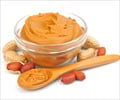Peanut husk, one of the largest waste products of the food industry, may be of some use after all -- it can help improve water quality, says a new study.
Peanut husk, one of the largest waste products of the food industry, may be of some use after all -- it can help improve water quality, says a new study.
According to researchers at Turkey's Mersin University, peanut husk can be used to extract toxic copper ions from wastewater, offering a useful alternative to simple disposal of this food industry by-product.Findings of the study have been published in the latest edition of the International Journal of Environment and Pollution.
Copper is an element found in many living organisms, but at high levels it can be harmful, and when discharged into natural water resources it could pose a threat to marine ecosystems.
Several industries produce wastewater containing dissolved copper ions, including those that carry out metal cleaning and plating, paper pulp, paperboard mills and wood pulp production sites and the fertiliser industry.
There are several sophisticated processes by which to remove copper ions from water, but the Turkish researchers have found a simpler solution.
Investigating the potential of several materials to absorb dissolved copper, the researchers found that peanut husk could remove 95 percent of the copper ions from water.
Advertisement
VEN/C











